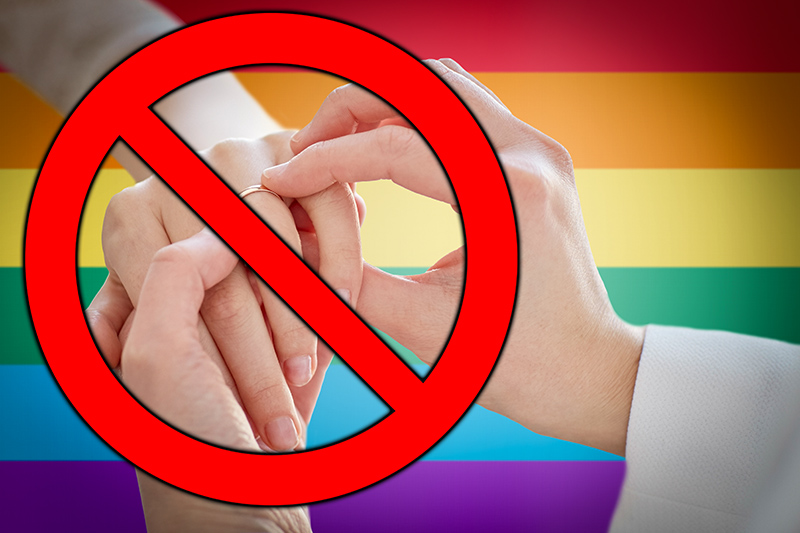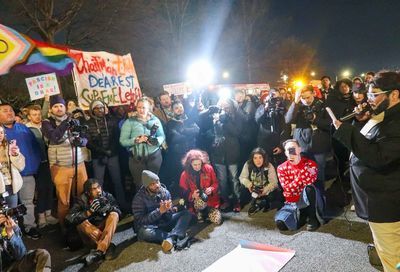LGBTQ groups praise Biden’s Supreme Court nominee
HRC, NBJC, and GLAAD applaud the nomination of D.C. Circuit Judge Ketanji Brown Jackson for nation's highest court.

The nation’s largest LGBTQ group is applauding reports that President Joe Biden will nominate D.C. Circuit Court of Appeals Judge Ketanji Brown Jackson to the post of Associate Justice on the U.S. Supreme Court.
According to The Washington Post, Biden will nominate Jackson to replace the retiring Justice Stephen Breyer, fulfilling a campaign promise that he would nominate the first Black woman to the nation’s highest court.
Jackson, 51, would be only the third Black person to serve on the court in its 233-year history. A former public defender, she would also be the first justice since Thurgood Marshall with significant experience as a defense attorney. She was a law clerk for Breyer, the man she would replace, from 1999 to 2000, and helped shape federal sentencing policy on the U.S. Sentencing Commission after stints at private law firms.
Jackson, a graduate of Harvard Law School and supervising editor of the Harvard Law Review, was born in Washington, D.C. and raised in Miami as the daughter or two public school teachers. Two of her uncles were law enforcement officers, including a former Miami police chief. She previously served as a trial court judge in Washington, D.C. for eight years before being elevated by Biden last year for a spot on the U.S. Court of Appeals for the D.C. Circuit. She was later confirmed to the court with the votes of three Republicans — Sen. Susan Collins (Maine), Mitt Romney (Utah), and Lisa Murkowski (Alaska).
If confirmed, Jackson would not change the balance of the court, which is stacked 6-3 in favor of conservatives, including three nominated by former President Donald Trump, but would bring youth and another diverse perspective to the court’s liberal wing, which has been significantly weakened since the passing of former Justice Ruth Bader Ginsburg.
In a statement, the Human Rights Campaign, the nation’s largest LGBTQ civil rights organization, praised Jackson and said it looks forward to a “thorough examination of her judicial philosophy and record.”
“The Supreme Court and its Justices are tasked with the sacred responsibility of upholding the rights of all Americans. Throughout Judge Ketanji Brown Jackson’s career, where she was appointed to the U.S. Sentencing Commission and during her time on the federal bench, she has earned a reputation for integrity, professionalism, and unwavering commitment to the Constitution,” HRC Interim President Joni Madison said in a statement. “Her tenure on the bench provides ample evidence that she is both prepared and trustworthy of this highest privilege, and responsibility, that comes with sitting on our highest court.”
The organization noted that past Supreme Court decisions have established important legal precedents that have led to the expansion of LGBTQ rights, including the Romer v. Evans decision finding that a Colorado state law prohibiting protected status for gays, lesbians, and bisexuals violates the Equal Protection Clause, the Lawrence v. Texas decision overturning state laws criminalizing consensual same-sex activity, the Obergefell v. Hodges decision overturning state bans on same-sex marriage, and the Bostock v. Clayton County decision finding that anti-LGBTQ discrimination in employment violates the Civil Rights Act.
“The Supreme Court has historically played an outsized role in affirming the constitutional rights of LGBTQ+ individuals and other marginalized communities. After a careful review of her record, it is clear that Jackson’s demonstrated fidelity to the principles of our Constitution instills confidence that she will continue Justice Breyer’s legacy as a champion of equality,” Madison added. “As such, the Human Rights Campaign is proud to support Jackson to be the newest Associate Justice of the United States Supreme Court. She is an extremely qualified candidate and her confirmation will mark significant progress towards ensuring that those who sit upon our highest court reflect the diversity of the nation whose laws they are entrusted to interpret.”
HRC did not seem to take issue with what some consider the one blemish regarding LGBTQ equality on Jackson’s record, although she never issued a decision from the bench that could be characterized as hostile to LGBTQ rights.
As reported by the conservative Washington Examiner, Jackson once previously worked as an adviser for Montrose Christian School, a Baptist school in the D.C. suburbs of Maryland affiliated with Montrose Baptist Church. The now-defunct school had a mission statement on its website urging students to uphold a “Christian character,” meaning they should oppose “all forms of sexual immorality, including adultery, homosexuality, and pornography.” The mission statement also implicitly condemned abortion, urging students to “speak on behalf of the unborn and contend for the sanctity of all human life from conception to natural death.”
When she was nominated to the D.C. Circuit Court of Appeals, Jackson addressed her work at the school, telling Sen. Dick Durbin (D-Ill.) during her confirmation process that her role on the advisory board for Montrose Baptist Church was limited and she was unaware of the school’s position statement. She added that her work on the advisory school board primarily involved planning for school fundraising activities and that she received no compensation for her work.
Other LGBTQ groups also praised Jackson’s nomination.
“With newly-appointed conservative Justices likely to willfully use the Court to roll back hard-fought rights, the nomination of Judge Jackson is long overdue representation exactly where it is needed most, especially for the most marginalized in our country,” Sarah Kate Ellis, the president and CEO of GLAAD, said in a statement.
“Nearly all of the LGBTQ community’s nationwide rights have been provided and protected by the justices on the Supreme Court, including Obergefell v. Hodges, which granted nationwide marriage equality, to Bockstock v. Clayton County, which affirmed LGBTQ people are protected from employment discrimination. The Supreme Court has played a key role in the fight for LGBTQ equality and must be a bulwark against discrimination, so that every American has a greater chance to belong, contribute and succeed. GLAAD urges a fair and swift hearing of Judge Jackson’s credentials so she can continue to ensure a more just, more prosperous nation for all of us.”
“The nomination of Judge Ketanji Brown Jackson to the U.S. Supreme Court is historic — not just because if confirmed she will be the first Black woman to serve on the court but because she is also the first former public defender to be nominated for this role,” David Johns, the executive director of the National Black Justice Coalition, said in a statement.
“Make no mistake, Judge Jackson’s lived and professional experience make her uniquely qualified for the Supreme Court and her role in bringing equity to sentencing is an important skill set currently missing from the Supreme Court. Jackson’s handling of cases during her time as a public defender showed she won real victories that advanced racial justice and equal treatment under the law in our criminal legal system.”
“The U.S. Supreme Court is a branch of government that should include diversity of life experiences of the American people on its bench. Judge Jackson would provide important racial and gender perspectives as well as cultural competency to assist in fair, equitable, and objective rulings,” Victoria Kirby York, the deputy executive director of NBJC, said in a statement.
“Considering nearly half of the people in women’s prisons across the country identify as LGBTQ+, many of them Black, it is important that we see ourselves represented and reflected in our nation’s highest court and representation of the system. … Judicial rulings may strive to be objective, but the impact is often not race- or gender-neutral. Justice Jackson, much like Justice Sotomayor, will bring the intersecting experiences of being a racial minority, a woman, a wife, and a mother alongside the traditional credentials of the court in ways that will prayerfully make a difference in the lives of millions of Americans too often made invisible in the decisions affecting our lives.”
Support Metro Weekly’s Journalism
These are challenging times for news organizations. And yet it’s crucial we stay active and provide vital resources and information to both our local readers and the world. So won’t you please take a moment and consider supporting Metro Weekly with a membership? For as little as $5 a month, you can help ensure Metro Weekly magazine and MetroWeekly.com remain free, viable resources as we provide the best, most diverse, culturally-resonant LGBTQ coverage in both the D.C. region and around the world. Memberships come with exclusive perks and discounts, your own personal digital delivery of each week’s magazine (and an archive), access to our Member's Lounge when it launches this fall, and exclusive members-only items like Metro Weekly Membership Mugs and Tote Bags! Check out all our membership levels here and please join us today!

























You must be logged in to post a comment.